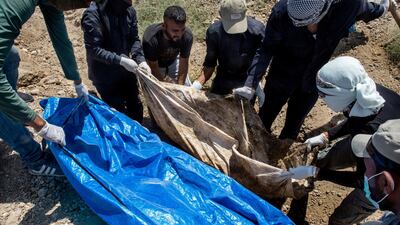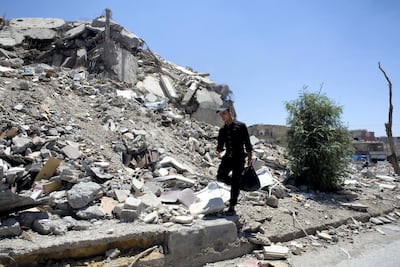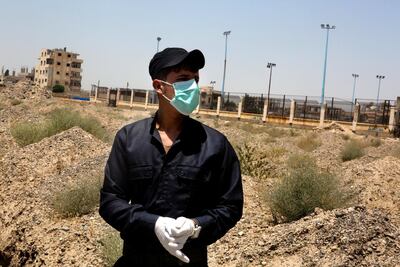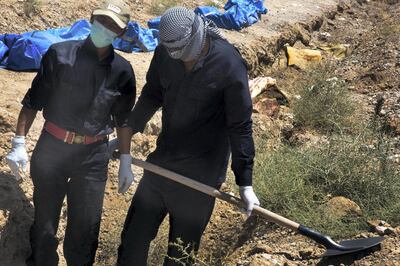Nine months after the liberation of Raqqa from ISIS, the northern Syrian city lies in a heap of debris. Some buildings are crumpled in on themselves, punctured by protruding metal beams and drooping electric wiring, others are just skeletons of what were once people's homes. On the dusty streets, the burnt carcasses of cars and chunks of plaster are strewn everywhere.
Raqqa fell to ISIS in January 2014, becoming the group's de-facto capital. For more than three years the city was ruled by Abu Bakr Al Baghdadi's men. In October 2017, following a four-month siege, Raqqa was recaptured by a coalition of Kurdish-led Syrian Democratic Forces and US air power. The city, once home to 200,000 was largely flattened.
But the endless mounds of rubble that mark the landscape are not the only legacy of the war. An acrid smell of dead bodies lingers in the air.
There are no official figures, but some estimates put the number of civilians killed during the retaking of Raqqa at 1,873 at least.
“Most of the bodies are still under the rubble”, said Zaid Hammdi, the owner of an ice-cream shop in front of Naim square, where ISIS militants carried out public executions and crucifixions.
Not far from his shop, under the scorching midday sun, a group of fatigued men wearing mouth masks, blue overalls and gloves shovel through the rubble. Ditches pepper the ground around them.
They are members of Raqqa's Civil Defence Unit, a team of 105 firefighters and other first aid responders, tasked with recovering bodies.
Closer to the excavation site, the smell of death grows pungent.
“This is a young boy, aged around 35-years-old”, says Assad Mohammed, an elderly medical examiner, inspecting the body's teeth. “He probably died inside a hospital since he is wrapped in a sheet,” Dr Mohammed tells his assistant, who scribbles the details in a notebook.
__________
Read more:
Editorial: The UAE's pledge of $50 million to rebuild Raqqa should encourage other donors to step forward
Coalition attacks on Syria's Raqqa may have broken law, Amnesty says
__________
For six months now members of the Civil Defence Unit have worked day in and day out to uncover mass graves and makeshift cemeteries.
In June Raqqa's First Responders Team - part of the Civil Defence Unit - uncovered a mass grave containing 553 bodies in the city's Al Rashid local playground. They have since begun exhuming a second grave.
Human Rights Watch say there are at least nine mass graves in Raqqa, each one with an estimated dozens, if not hundreds, of bodies. This, said HRW Priyanka Motaparthy makes exhumations a monumental task.
“I became the friend of death,” says Dr Mohammed. “Most of the bodies we found [inside the grave] have been buried quickly by their relatives or acquaintance during the fighting. They’re not people killed by ISIS.”
According to Turkey Ali, the administrative supervisor of the Civil Defense Unit, most deaths were a result of air strikes. “We have found up to 70 bodies a day under a bombed building. We have extracted burned corpses, parts of bodies. We have recovered around 1,200 bodies under the rubble but most of them are not identified."
This is carried out without DNA identification technology, Mr Ali told The National.
“We look at their bones and teeth to discover their gender and age and their clothes. We write everything in a file, the quality of clothes, the neighbourhood where we find the bodies and if they have any objects with them. Each one has its own file and we save all the information" says Mr Ali.
According to a HRW report the lack of technical assistance could damage and destroy evidence crucial to future justice efforts and may not provide families with the answers they have been waiting for.
As Mr Ali and his team dig up the ground in Zoo Park, in Raqqa's Al Furat neighbourhod, a man in a red keffiyeh asks after his relatives: "my cousin and uncles were captured by Daesh in 2014. Where are their bodies? Do you have any information?"
"We didn't find any ISIS mass graves inside Raqqa city," Mr Ali tells him. "Bodies were probably dumped outside the city or thrown in the river,” he says in reference to civilians killed by ISIS.
According to the Syrian Observatory for Human Rights, ISIS detained over 7,000 Syrians between 2013 and 2017. But after a long military campaign that left thousands dead, hundreds of thousands displaced and most of the city reduced to rubble, many ISIS detainees are still missing.
Patchy information has driven desperate families to search for their loved ones through social media. In late 2017, family members of the disappeared launched a Facebook campaign called Where are the kidnapped by ISIS? in an effort to mobilise the US-led coalition to help them find their friends and family.
“Many people came to us asking for information about their relatives detained or kidnapped by ISIS. Until now we didn’t find any evidence. We are few and we are doing our best. We need some international support,” said Mr Ali.
Not far from the site, a sandstorm approaches. Two young men wander over to the ditches. One gestures to Mr Ali: "we buried our father here during the siege. Can you help us to find his body?"




